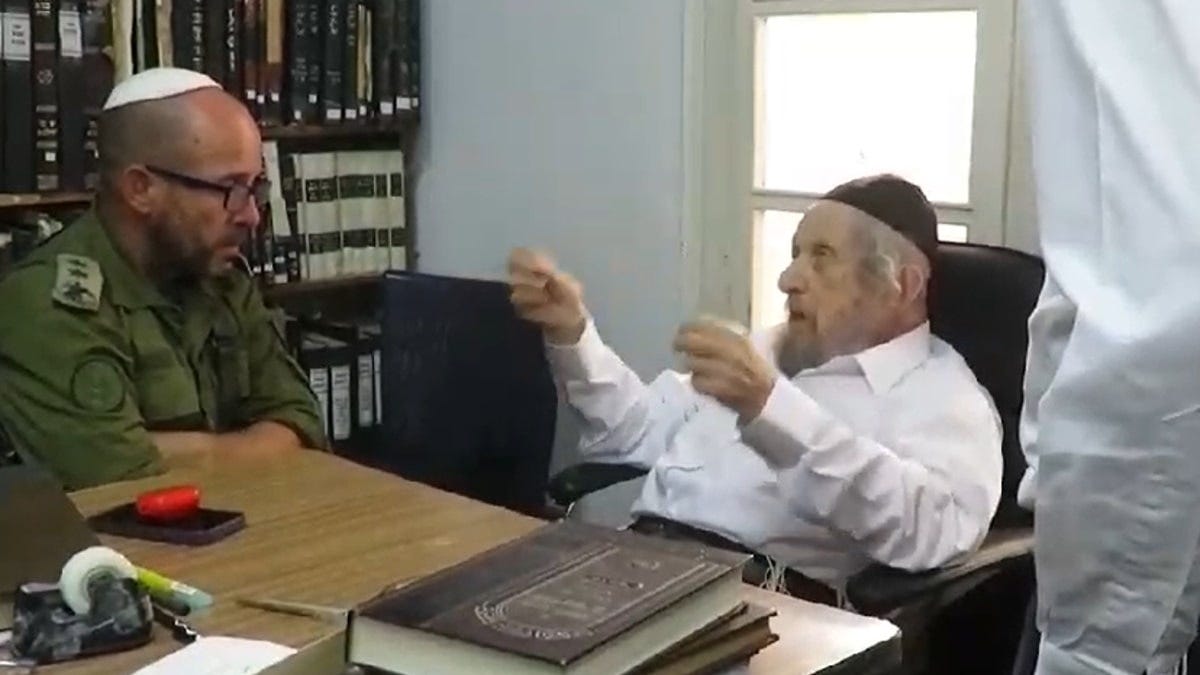Daas Torah and Army
Are the Gedolim experts on the Jewish approach to IDF service?
The other day a woman asked me an interesting question. She said that her gut feeling tells her that everyone needs to serve in the army. But she said that she is not a Torah scholar, and surely The Gedolim™ are the experts on Judaism. And so surely they are reliable to determine what the Jewish approach to serving in the army is?
In response, I first pointed out there are also non-charedi Gedolei Torah who take the opposite position. The woman replied that this makes her all the more confused! How can experts in Torah take diametrically opposed viewpoints on such a thing?
The answer is that the charedi Gedolim are not “experts in knowing the Torah approach to this topic.” They are experts in knowing the charedi approach to the Torah approach to this topic. Which is not the same thing at all.
“Torah” is a very broad and vague term. There’s Tanach and Talmud and Halacha and Kabbalah and Machshava and theology. And within these, there are multiple different schools of thought. And there are also ideologies and agendas which affect one’s approach.
Who is an “expert” on the efficacy of the more esoteric types of Eastern medicine, such as using ground tiger bone to treat ulcers, typhoid, and malaria? An elderly experienced practitioner of it from a rural Asian village, or a first-year American medical student?
Who is a greater “expert” on the Bible? The Pope, or a Jewish kid? The Pope certainly “knows” the Bible better than the Jewish kid. Does that mean that the Pope is a greater authority than the Jewish kid in declaring that the Bible points towards Jesus being the Messiah?
Who is a greater expert on the Torah’s approach to spontaneous generation and an age of dinosaurs? The charedi Gedolim or a random YU student? Most charedi Gedolim insist that Judaism requires you to believe in spontaneous generation and to deny an age of dinosaurs. Most YU students will say that it doesn’t. Who is correct?
Expertise on knowing the Torah approach to Torah and science relates to such things as a knowledge of historic rabbinic approaches to these topics, a knowledge of science, and the cultural breadth and intellectual honesty to acknowledge divergent viewpoints. The fact is that most charedi Gedolim simply don’t possess these.
Expertise on knowing the Torah approach to contemporary army service likewise does not merely depend on how many pages of Gemara and other sefarim you have mastered. It relates to several things:
An awareness of Jewish history - from Biblical times to recent times;
A knowledge of Torah sources relating to this topic;
A skilled analysis of the sources;
Intellectual honesty to enable one to understand what the Torah says, rather than forcing it to conform with a particular approach;
The ability to form a comprehensive and consistent approach which will work in a practical application;
Understanding how aspects of life and society in Israel may affect the topic;
Possessing the full spectrum of Jewish values, including respect for the role of Torah and mitzvos, and care for the Jewish People.
In forthcoming posts, I will demonstrate how these play out.
A full list of my posts on the topic of IDF service is at Torah and Army: The Big Index




"How can experts in Torah take diametrically opposed viewpoints on such a thing?"
Just wait until she hears about this thing called the Talmud...
When your books were banned, several decades ago, I reassessed my understanding of the meaning of "Daas Torah".
Until that time, I had thought that the "Gedolim" were not only experts in Torah, but had the wisdom and understanding to know that when confronted with a Halachic issue that involved specialized knowledge, they would have the humility to consult with experts in the field before making a ruling.
This was certainly true of Gedolim of pervious generations. people like the Tzitz Eliezer, Rav Moshe, or Rav Shlomo Zalman would regularly consult with doctors, scientists, engineers, lawyers, or other experts before making a Halachic ruling. This is also true for many modern Poskei Halacha in our generation. During Carona the (then) Chief Rabbi would regularly consult with doctors and experts from Ministry of Health before making rulings about issues related to the pandemic (For example, how should burial be handled by people who died from the disease without putting people handling the body at risk, how can someone in isolation or intensive care hear Parshat Zachor, how can minyanim be established without putting people at risk, etc). Rav Lau recently published a book of his Tshuvot from that period, and it is full of expert opinions on which his rulings are based.
However, when your books were banned I came to the realization that there are many people who are regarded as Haredi Gedolim who don't believe that it is necessary to get all the relevant information before making a ruling.
Today a common refrain I have heard from Haredi apologists is that there is no manpower shortage the army, and the IDF has enough soldiers without drafting Bochrim. I do not know if a single "Gadol" has spoken to experts from the army, the finance ministry, and psychologists, to determine how many soldiers the army currently has, how many they need to maintain the war, how many Miluimnikim are being called up for the second, third or forth time, and what the mental health and economic implications of that are etc.
Instead, as far as I can tell (and I would be happy to be proven wrong), they made a proclamation that "The Army has enough soldiers", without making any attempt to back up the claim with data, and because the "Gedolim" have spoken, and they have studied lots of Gemara, therefore it must be true.
End of discussion (At least for people who accept the Haredi understanding of "Daas Torah".